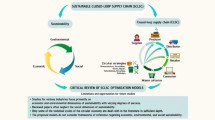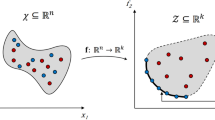Abstract
A set of models of sequentially growing complexity for enterprise multicriteria decision-making (output planning, borrowing/granting funds, investments in efficiency improvement and production capacity increase) is considered. Simulation results are presented, and also the development and application of system optimization methods to the modeling of production and economic activities of enterprises are discussed.
Similar content being viewed by others
References
Burkov, V.N., Korgin, N.A., and Novikov, D.A., Complexification and Decomposition Problems of Control Mechanisms for Organizational and Technical Systems, Probl. Upravlen., 2016, no. 5, pp. 14–23.
Burkov, V.N., Gorgidze, I.A., Javakhadze, G.S., Pranguishvili, I.V., and Khurodze, R.A., Systemic Regularities and Systemic Optimization, Hauppauge: Nova Science, 2009.
Buslenko, N.P., Modelirovanie slozhnykh sistem (Modeling of Complex Systems), Moscow: Nauka, 1968.
Geras’kin, M.I. and Grishanov, G.M., Ekonomiko-matematicheskoe modelirovanie sovremennykh promyshlennykh kompleksov (Economic-Mathematical Modeling of Modern Industrial Complexes), Samara: Samarsk. Nauchn. Tsentr Ross. Akad. Nauk, 2016.
Glushkov, V.M., On System Optimization, Kibernetika, 1980, no. 5, pp. 89–90.
Glushkov, V.M., Mikhalevich, V.S., Volkovich, V.L., and Didenko, G.A., System Optimization and Multitest Linear-Programming Problems for Preference Assigned as Intervals, Cybernetics, 1983, no. 3, pp. 287–297.
Granberg, A.G. and Suspitsin, A.S., Vvedenie v sistemnoe modelirovanie narodnogo khozyaistva (Introduction to System Modeling of National Economy), Novosibirsk: Nauka, 1988.
Dranko, O.I., Finansovyi menedzhment. Tekhnologii upravleniya finansami predpriyatiya (Financial Management: Technologies for Operating Enterprise Finances), Moscow: Yuniti-Dana, 2004.
Dudov, S.I., Vygodchikova, I.Yu., and Kuptsov, S.N., Matematicheskie metody v ekonomike (Mathematical Methods in Economics), Saratov: Saratovsk. Gos. Univ., 2014.
Zamkov, O.O., Tolstopyatenko, A.V., and Cheremnykh, Yu.N., Matematicheskie metody v ekonomike (Mathematical Methods in Economics), Moscow: Mosk. Gos. Univ., 2009.
Zaskanov, V.G. and Ivanov, D.Yu., Vnutrifirmennye modeli organizatsii proizvodstva na predpriyatiyakh mashinostroeniya: teoriya i praktika (Internal Models of Industrial Engineering for Machine Works: Theory and Practice), Samara: Samarsk. Nauchn. Tsentr Ross. Akad. Nauk, 2016.
Ivanilov, Yu.P. and Lotov, A.V., Matematicheskie modeli v ekonomike (Mathematical Models in Economics), Moscow: Nauka, 1979.
Intriligator, M., Mathematical Optimization and Economic Theory, New York: Prentice-Hall, 1971.
Irikov, V.A., Zolotukhin, I.N., and Lisin, D.S., Cluster Model and System Development Coordination Algorithm, Spetstekhn. Svyaz, 2012, no. 5, pp. 72–76.
Irikov, V.A. and Trenev, V.N., Raspredelennye sistemy prinyatiya reshenii. Teoriya i praktika (Distributed Decision Systems: Theory and Applications), Moscow: Fizmatlit, 1999.
Irikov, V.A., Trenev, V.N., et al., Analiz vozmozhnostei na osnove parametricheskoi modeli sistemnoi optimizatsii (Opportunity Analysis Based on a Parametric System Optimization Model), Dolgoprudny: Mosk. Fiziko-Tekhn. Inst., 1990.
Kleiner, G.B., Proizvodsnvennye funktsii: teoriya, metody, primeneniya (Production Functions: Theory, Methods, Applications), Moscow: Finansy i Statistika, 1986.
Kobrinsky, N.E., Maiminas, E.Z., and Smirnov, A.D., Ekonomicheskaya kibernetika (Economic Cybernetics), Moscow: Ekonomika, 1982.
Kovalev, V.V., Finansovyi analiz. Metody i protsedury (Financial Analysis: Methods and Procedures), Moscow: Finansy i Statistika, 2006.
McConnell, C.R. and Brue, S.L., Economics, New York: McGraw-Hill, 1993.
Malugin, V.A. and Fadeeva, L.N., Kolichestvennyi analiz v ekonomike i menedzhmente: uchebnik (Quantitative Analysis in Economics and Management: A Textbook), Moscow: INFRA-M, 2014.
Mesarovic, M., Mako, D., and Takahara, Y., Theory of Hierarchical, Multilevel Systems, New York: Academic, 1970. Translated under the title Teoriya ierarkhicheskikh mnogourovnevykh sistem, Moscow: Mir, 1973.
Milgrom, P.R. and Roberts, J., Economics, Organization, and Management, Englewood Cliffs: Prentice-Hall, 1992.
Mikhalevich, V.S. and Volkovich, V.L., Vychislitel’nye metody issledovaniya i proektirovaniya slozhnykh sistem (Computational Methods for the Analysis and Design of Complex Systems), Moscow: Nauka, 1982.
Molodtsov, D.A., Ustoichivost’ printsipov optimal’nosti (Stability of Optimality Principles), Moscow: Nauka, 1987.
Nesterov, Yu.E., Vvedenie v vypukluyu optimizatsiyu (Introduction to Convex Optimization), Moscow: Mosk. Tsentr Nepreryvn. Mat. Obraz., 2010.
Novikov, A.M. and Novikov, D.A., Research Methodology: From Philosophy of Science to Research Design, Amsterdam: CRC Press, 2013.
Novikov, D.A., Cybernetics: From Past to Future, Heidelberg: Springer, 2016.
Opoitsev, V.I., Ravnovesie i ustoichivost’ v modelyakh kollektivnogo povedeniya (Equilibrium and Stability in Collective Behavior Models), Moscow: Nauka, 1977.
Pervozvanskii, A.A. and Gaitsgori, V.G., Dekompozitsiya, agregirovanie i priblizhennaya optimizatsiya (Decomposition, Aggregation and Approximate Optimization), Moscow: Nauka, 1979.
Pindyck, R.S. and Rubinfeld, D.L., Microeconomics, Upper Saddle River: Prentice Hall, 1998.
Polshkov, Yu.N., Ekonomiko-matematicheskoe modelirovanie v kursovykh i diplomnykh rabotakh (Economic and Mathematical Modeling in Term Papers and Dissertations), Donetsk: Donetsk. Natsion. Univ., 2016.
Popov, A.M. and Sotnikov, V.N., Ekonomiko-matematicheskie metody i modeli (Economic-Mathematical Methods and Models), Moscow: Yurait, 2013.
Pospelov, G.S. and Irikov, V.A., Programmno-tselevoe planirovanie i upravlenie (Planning and Management by Objectives), Moscow: Sovetskoe Radio, 1976.
Pospelov, G.S., Irikov, V.A., and Kurilov, A.E., Protsedury i algoritmy formirovaniya kompleksnykh programm (Procedures and Algorithms of Forming Complex Programs), Moscow: Nauka, 1985.
Roshchin, A.A., Raschet Dinamicheskikh Sistem (RDS). Rukovodstvo dlya programmistov. Prilozheniye: opisanie funktsii i struktur. Prilozheniye k rukovodstvu dlya programmistov (Calculation of Dynamic Systems (RDS). A Guide for Programmers. Appendix: Description of Functions and Structures. Appendix to the Manual for Programmers), Moscow: Inst. Problem. Upravlen., 2012.
Yankovoi, A.G., Matematiko-statisticheskie metody i modeli v upravlenii predpriyatiem: uchebnoe posobie (Mathematical-Statistical Methods and Models in Enterprise Management: A Textbook), Odessa: Odessk. Natsion. Ekon. Univ., 2014.
Bray, M., Razin, R., and Sarychev, A., Mathematical Economics, London: Univ. of London, 2015.
Fuente, A., Mathematical Methods and Models for Economists, Cambridge: Cambridge Univ. Press, 2000.
Hillier, F. and Lieberman, G., Introduction to Operations Research, Boston: McGraw-Hill, 2005. 8th ed.
Mas-Collel, A., Whinston, M.D., and Green, J.R., Microeconomic Theory, New York: Oxford Univ. Press, 1995.
Mechanism Design and Management: Mathematical Methods for Smart Organizations, Novikov, D.A., Ed., New York: Nova Science, 2013.
Morgan, M., The World in the Model: How Economists Work and Think, Cambridge: Cambridge Univ. Press, 2012.
Novikov, D., Hierarchical Models in Modern Control Theory, in Challenges in Automation, Robotics and Measurement Techniques, Heidelberg: Springer, 2016. pp. 3–12.
Novikov, D.A., Management of Active Systems: Stability or Efficiency, Syst. Sci., 2001. vol. 26, no. 2, pp. 85–93.
Novikov, D., Theory of Control in Organizations, New York: Nova Science, 2013.
Sayama, S., Introduction to the Modeling and Analysis of Complex Systems, New York: State Univ. of New York, 2015.
Taha, H., Operations Research: An Introduction, New York: Prentice Hall, 2011. 9th ed.
Wagner, H., Principles of Operations Research, Upper Saddle River: Prentice Hall, 1975. 2nd ed.
Acknowledgments
This work was supported in part by the Russian Science Foundation, project no. 16-19-10609.
Author information
Authors and Affiliations
Corresponding author
Additional information
Russian Text © The Author(s), 2017, published in Upravlenie Bol’shimi Sistemami, 2017, No. 65, pp. 118–152.
Rights and permissions
About this article
Cite this article
Novikov, D.A. Complex Models of System Optimization for the Production and Economic Activity of an Enterprise. Autom Remote Control 80, 2068–2089 (2019). https://doi.org/10.1134/S0005117919110109
Received:
Revised:
Accepted:
Published:
Issue Date:
DOI: https://doi.org/10.1134/S0005117919110109




